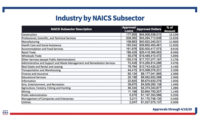Further changes are in store for the Paycheck Protection Program of refundable federal loans with the enactement of legislation to provide more help for small companies as they continue to deal with blows dealt to their businesses by the coronavirus pandemic.
President Trump signed the new bill on June 5. It had won final congressional approval two days earlier when the Senate passed it.
The House cleared the legislation on May 28 by an overwhelming 417-1 vote. The measure has the support of construction and engineering organizations.
A key change in the new measure deals with requirements for how companies receiving PPP loans must spend the money to qualify for full forgiveness.
It states that a minimum of 60% of loan proceeds now must go for payroll to merit forgiveness, from the earlier requirement that 75% of a company’s PPP dollars be spent on payroll.
The new statute also allows PPP recipients to have loans forgiven for expenditures incurred over 24 weeks, instead of eight weeks under the Coronavirus Aid, Relief and Economic Recovery, or CARES, Act, which created the program.
Borrowers still will have the option to choose to use the eight-week plan under the new measure.
Another change allows loan recipients that don’t seek or qualify for forgiveness to begin paying their loans in five years, compared with a two-year maturity period now.
Brian Turmail, an Associated General Contractors of America spokesman, called the bill's approval "a very positive development that will help save countless construction jobs.”
Other industry groups that backed the new PPP legislation include the Associated Builders and Contractors and American Council of Engineering Companies.
In the Senate, Minority Leader Chuck Schumer (D-N.Y.) had sought to have the PPP bill approved by unanimous consent earlier in the afternoon of June 3. Under that procedure, consent is denied if even a single senator objects. Sen. Ron Johnson (R-Wis.) objected.
Johnson said it was unclear whether the new bill allowed companies to apply for PPP loans as late as Dec. 31. The CARES Act’s cutoff for seeking a PPP loan is June 30.
Johnson indicated he would like to see a letter clarifying the point published in the Congressional Record.
About three hours after Johnson’s objection, Majority Leader Mitch McConnell (R-Ky.) came to the floor and brought up the PPP bill for a vote.
This time it passed on a voice vote and the Senate adjourned shortly after that.
Still more changes to PPP may lie in the future. McConnell said other Republican senators had identified further changes needed in the program and he said he anticipated Congress would address those.
The letter Johnson referred to was published in the Congressional Record for June 3. It was signed by Johnson, as well as Senate Small Business and Entrepreneurship Committee Chairman Marco Rubio (R-Fla.), Sen. Benjamin Cardin (Md.,) that committee's top Democrat; Sen. Mike Lee (R-Utah); and the main authors of the House PPP flexibility bill, Reps. Dean Phillips (D-Minn.) and Chip Roy (R-Texas).
It states that the bill's extension of the period in which PPP borrowers can expend loan funds "should not be construed so as to permit the [Small Business Administration] to continue accepting applications for [PPP] loans after June 30, 2020."
Story updated on 6/5/2020 with bill signing.



Post a comment to this article
Report Abusive Comment